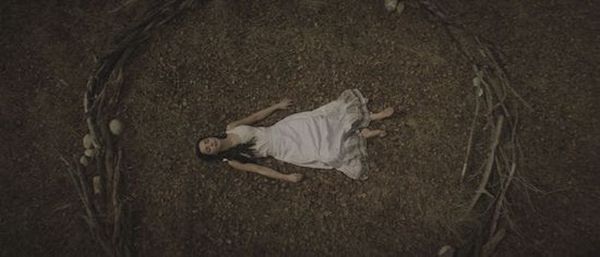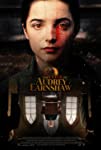Eye For Film >> Movies >> The Curse Of Audrey Earnshaw (2020) Film Review
The Curse Of Audrey Earnshaw
Reviewed by: Jennie Kermode

How much difference is there, in the end, between members of different religions faced with the same type of existential crisis? That's one of the questions addressed in Thomas Robert Lee's haunting portrait of community discord. Set in an obscure Christian sect which has held onto the old ways well into the 20th Century (whose influence we barely glimpse), it focuses on an outsider, Agatha Earnshaw (Catherine Walker), who is secretly involved with a heathen cult - and on her daughter, the titular Audrey, born during an eclipse.
The bulk of the action takes place in 1973, when Audrey is in her late teens, almost ready to be accepted into full womanhood by her mother's friends. She's been kept away from the other villagers by her worried mother, and when she witnesses her mother being threatened by one of them - a conflict that adults will recognise as complex, with both parties deserving some measure of sympathy - her instinctive response is to be angry. There's that potent teenage mixture of desire to protect one's loved ones and frustration at their apparent passivity in the face of provocation. Audrey feels anger for and at her mother. To make matters worse, she seems possessed of strange powers that might enable her to do something about it.

Lee balances his sympathies between the two religious groups, with a growing sympathy between Catherine and Christian priest Seamus (Sean McGinley), who shields her from other villagers' hostility. Both are facing similar problems; neither group ever considers looking to the wider world for opportunity or support. As their situation gets worse, both struggle to hang onto their faith. With Seamus watching over a flock troubled by hunger and disease, there's an echo of M Night Shyamalan's The Village - can this choice to live separately really be a virtuous one if children suffer and die as a result? Catherine, meanwhile, could help the villagers because she owns the only good land, so she too carries her burden of guilt.
In the midst of this complexity, Audrey is pure. She possesses that special sort of cruelty of which children, with the certainty that belongs to innocence, are capable. Her red lips and raven hair position her as something outside the villagers' experience, like a refugee from a Hammer films amidst the drab rural landscapes beautifully captures in Nick Thomas' cinematography, yet her power is never overtly sexual. We see her use the techniques of ancient witchcraft. It's implied that members of her cult have been doing so for many years, but in combination with her ruthlessness, they achieve something very different.
Witchcraft is a difficult subject for today's filmmakers, not least because of the public's shifting sympathies, but Lee has found a story in which it is a perfect fit. It's difficult at times to gauge the balance of actual supernatural power and effects brought about by belief - studies have shown that there can be a powerful psychosomatic effect where people have grown up in terror of particular practices. Either way, the film is very much at home at Fantasia 2020, where it is one of the more relentless and chilling offerings available.
Blending folk horror with the iconography of a western and the sense of a place that could be everywhere and nowhere, this is a film which relies heavily on atmosphere, sometimes at the expense of a coherent plot. It may not quite satisfy intellectually, but you'll really feel it.
Reviewed on: 24 Aug 2020
















